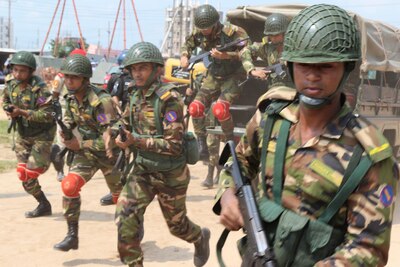DHAKA, Bangladesh, Oct. 13, 2017 — The eighth annual Pacific Resilience Disaster
Response Exercise and Exchange, or PR DREE, came to a successful close during a
ceremony here yesterday.
The theme of the five-day exercise was civil-military
integration and humanitarian assistance/disaster response in preparation for a
massive earthquake.
The event was co-sponsored by the Bangladesh Armed Forces
Division, the Ministry of Disaster Management and Relief and U.S. Pacific
Command.
U.S. Army Pacific sent 15 soldiers and airmen from the its
headquarters battalion, the 8th Theater Sustainment Command and the Oregon
National Guard, which has a state partnership with Bangladesh.
Air Vice Marshal Mashiuzzaman Serniabat of the Bangladesh
Armed Forces Division officially closed the exercise at the seremony, which
also featured remarks from Brig. Gen. Bryan E. Suntheimer, the deputy
commanding general of U.S. Army Pacific, and Deputy Gen. Reaz Ahmed of the Bangladesh
Department of Disaster Management.
Exercise Tests Disaster Relief Mission Coordination
"I do believe over the last five days you have
developed some a collective understanding among yourselves and built up
networking for improved interactions, which will help effective coordination
while working together for disaster management," Serniabat said.
The event brought together more than 1,400 participants from
13 nations, as well as dozens of government, nongovernment and international
organizations. Personnel worked together either through a phased tabletop
exercise here or a field training exercise held in Mymensingh, while testing
out earthquake preparation plans, response capabilities and command and control
organizational design.
"Partnerships play a critical role in meeting global
challenges, from maintaining peace to providing humanitarian assistance after
natural disasters," Suntheimer said. "Bringing your talents, ideas
and resources together magnifies our impact far beyond the immediate region.
Multinational partnerships are force multipliers for good around the
world."
The PR DREE, which has been held annually since 2010, is
built on the accomplishments of previous years' exercises. These years of
planning have enabled partners to test out doctrine and verify the validity of
the National Disaster Response Coordination Center's plans for disaster
response, while strengthening partnerships and communication between multiple
agencies, nations and stakeholders.
2017 South Asia Pacific Resilience Disaster Response
Exercise and Exchange in Dhaka, Bangladesh
Army Lt. Col. Demian San Miguel with the Oregon National
Guard has attended the PR DREE in Bangladesh for the last three years.
'There Was Excellent Coordination Across All Agencies'
"Every year the exercise gets better and better,"
San Miguel said. "There was excellent coordination across all
agencies."
San Miguel went on to say that the increased interaction and
immediate feedback to participants' questions made the event successful. The
inclusion of college students who study disaster management, he said, brought
an exciting, fresh perspective to the event.
The tabletop exercise familiarized participants with an
earthquake scenario, their various roles and responsibilities, and the numerous
themes of the exercise. Participants were assigned to cell groups, where they
deliberated over the proper emergency response to various scenarios. The
multinational, interagency teams developed search-and-rescue response
procedures, coordinated logistical support plans, verified shelter/relief plans
and procedures now in place, and increased coordination among international and
domestic organizations and agencies.
After three days working through strategic-level scenarios,
tabletop exercise participants gathered at the Bangladesh Staff College here to
review an operational execution of the plans during an earthquake field
training exercise by emergency responders. This was followed by an after-action
review on the final day.
Pacific Resilience is U.S. Army Pacific's main platform to
engage, partner with and prepare U.S. allies in the region in a
whole-of-government approach using the military and civilians to plan and
execute DREEs and other humanitarian aid/disaster response events, officials
said. It uses medical, engineering, humanitarian assistance and disaster
response and other related activities to implement, corroborate and exercise
plans, equipment and personnel against a variety of emergency scenarios that
continuously affect the Indo-Asia-Pacific region







No comments:
Post a Comment